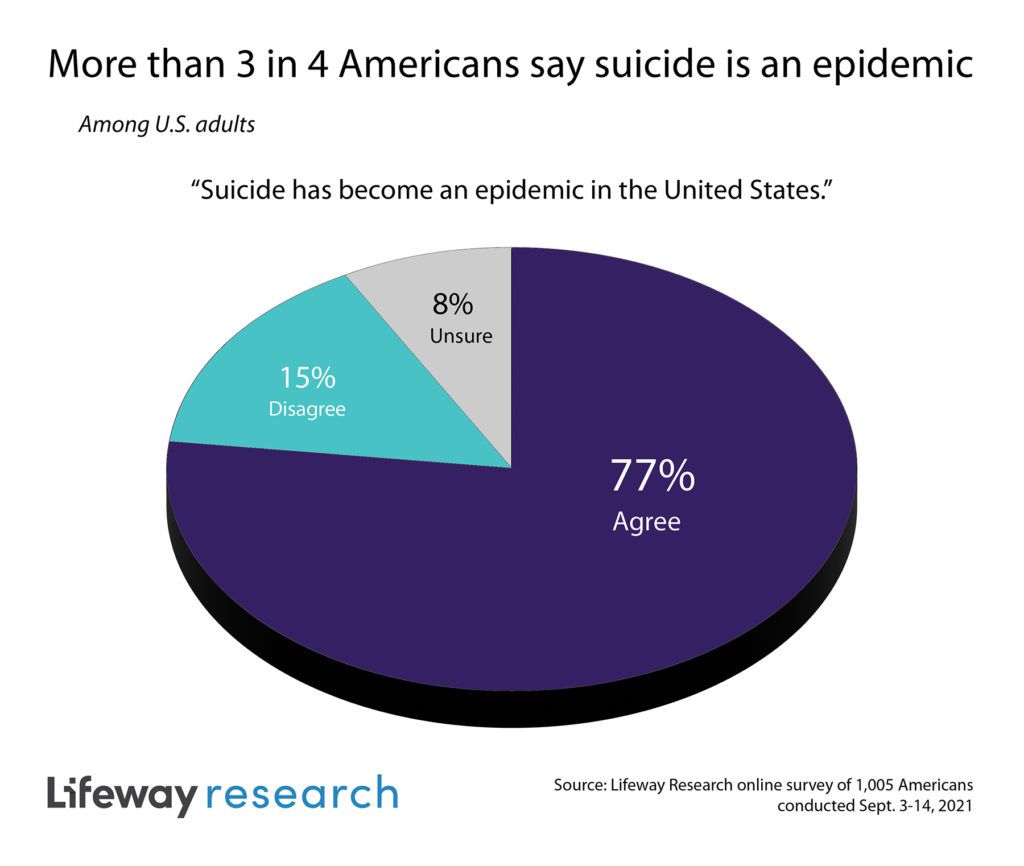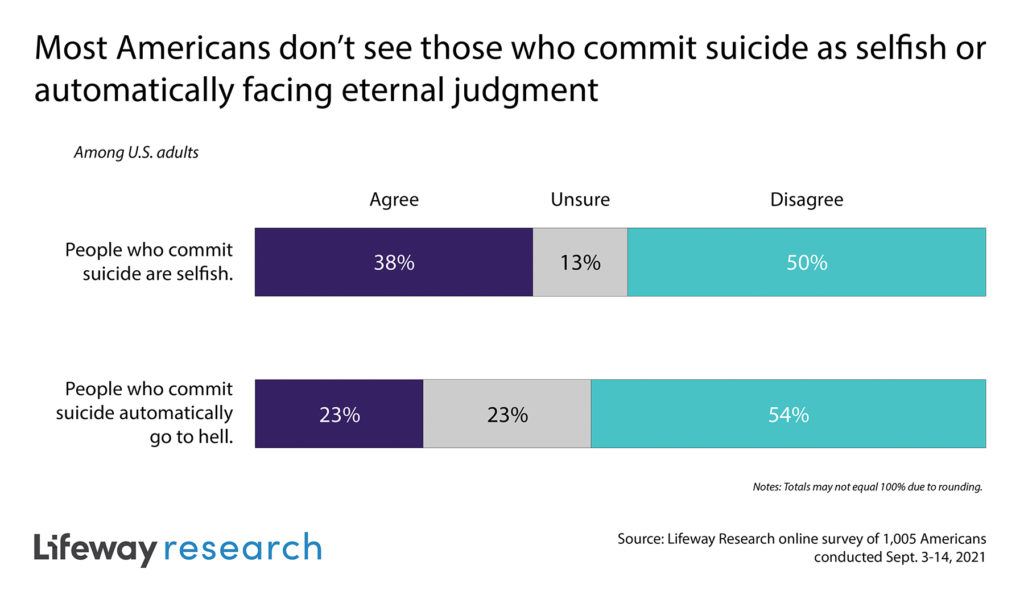 [1]
[1]NASHVILLE (BP) — Most Americans say suicide has become an epidemic in the United States, and few say people who commit suicide automatically go to hell.
In 2008, September was declared National Suicide Prevention Month [2] in the United States. According to the latest data from the Centers for Disease Control and Prevention [3], 45,979 people died by suicide in the United States in 2020, which amounts to one death every 11 minutes. Additionally, 12.2 million adults seriously thought about suicide in 2020.

According to a Lifeway Research online survey [4], most Americans (77%) believe suicide has become an epidemic in the United States, with 34% strongly agreeing and 44% somewhat agreeing. This number is larger than the 56% of Americans who agreed in a 2014 phone survey [5]. And the number of Americans who have a friend or family member who committed suicide has increased slightly since 2014 (39% v. 36%).
Few believe that people who commit suicide are selfish (38%) or are automatically going to hell (23%). Those numbers have remained relatively steady since 2014 when 36% said suicide was selfish and 23% said someone who commits suicide automatically goes to hell. Today, around 1 in 8 Americans (13%) strongly agree suicide is selfish, and 1 in 4 (25%) somewhat agree. One in 10 Americans (10%) strongly agree suicide automatically leads to hell and 13% somewhat agree.
“One would expect it to be hard for participants to disagree with the statement from the interviewer that suicide was an epidemic when asked on the phone survey in 2014. Yet more than a third did,” said Scott McConnell, executive director of Lifeway Research. “An online survey is not directly comparable to a phone survey. But one would expect that an online survey, where there is no interviewer to please, would make it easier to disagree with this statement. Yet, only 15% of Americans disagree that suicide has become an epidemic in the U.S.”
An epidemic close to home
Those who have been impacted by the loss of a friend or family member by suicide (86%) are more likely than those who have not been as closely affected (70%) to see suicide as an epidemic in the United States. Females are more likely than males to say they have a friend or relative who has committed suicide (43% v. 34%), and they are also more likely to say suicide is an epidemic (85% v. 70%). Similarly, those in the South are among the most likely to say they have a friend or family member who has committed suicide (43%) and to say suicide is an epidemic (81%). And white Americans are among the most likely to have a friend or family member who has committed suicide (42%) and to identify suicide as an epidemic (79%).

Younger Americans and those with lower levels of formal education are more likely to say suicide is an epidemic in the United States. Younger Americans, those 18-34 (83%) and 35-49 (82%), are more likely than older Americans, those 50-64 (70%) and over 64 (73%), to agree suicide has become an epidemic. One in 5 Americans with bachelor’s degrees (20%) and graduate degrees (20%) disagree, while fewer of those whose highest level of education is high school or less (13%) or some college (11%) disagree.
Beliefs about suicide
Some groups among the most likely to agree that suicide is selfish are also among the most likely to agree that someone who commits suicide automatically goes to hell. However, that is not the case for white Americans. While they are among the most likely to say people who commit suicide are selfish (39%), they are among the least likely to say people who commit suicide automatically go to hell (20%).
Religious beliefs and practice also play a role in attitudes toward suicide. Those with evangelical beliefs are more likely than those without evangelical beliefs to say suicide is selfish (48% v. 35%) and automatically leads to hell (39% v. 18%). The religiously unaffiliated are the most likely to disagree with the idea that suicide is selfish (64%). They are also among the most likely to disagree that someone who commits suicide automatically goes to hell (64%). And among Christians, those who attend worship services less than once a month, are the least likely to agree that suicide is selfish (36%) and the most likely to disagree that suicide automatically leads to hell (57%).
“For most, hell and selfishness are not the first things to come to mind when they think about suicide. Those less connected with Christian belief and practice are even less likely to see a selfish component to ending one’s life prematurely,” McConnell said. “Americans are twice as likely to see suicide as an epidemic to be stopped than a sin they can judge.”
In many cases, a person’s likely proximity to suicide contributes to their perspectives on the victims. Some that are the least likely to have experienced the loss of a loved one by suicide are among the most likely to say suicide is selfish and a path to hell. Whereas males are less likely than females to have a friend or relative who has committed suicide (34% v. 43%), they are more likely to say suicide is selfish (43% v. 33%) and leads to hell (27% v. 19%). Similarly, African Americans (32%) and Hispanics (30%) are among the least likely to have been closely impacted by suicide. And African Americans (31%) and Hispanics (31%) are among the most likely to say people who commit suicide automatically go to hell.
“It appears that some who are more distant from those who have taken their own lives are quicker to judge these actions,” McConnell said. “But it may also be true that those who have consequential views of suicide are less likely to be in communities that consider it.
“Jesus taught that each person should love their neighbors as God loves each of us. Each person has value and purpose because they are loved by God and others,” McConnell continued. “When each life matters individually and to the community, voluntarily removing any life is tragic.”
If you are experiencing mental health-related distress or are worried about a loved one who may need crisis support, contact the 988 Suicide and Crisis Lifeline [7] by calling or texting 988.
